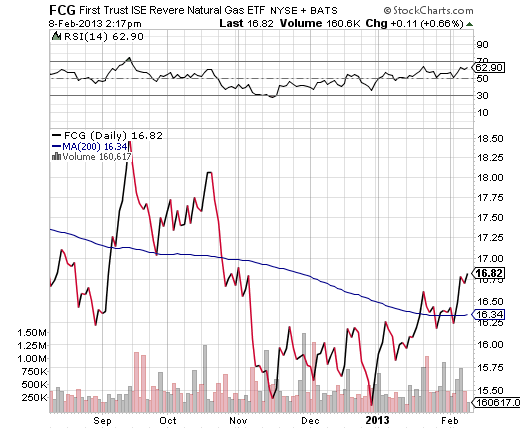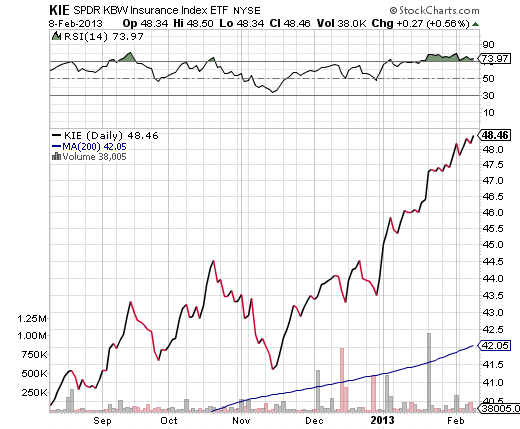Investing in stock assets when the S&P 500 is hitting fresh highs can be as dangerous as driving on a yet-to-be-plowed stretch of highway. You may get to your destination without a hitch. Then again, you might spin out of control and crash.
At present, both the Eurozone’s ongoing recession and “Snowmageddon” on the East Coast are likely to have an adverse impact on U.S. economic growth. It follows that a blind allocation in a blizzard is ill-advised.
Traditionally, clean-up efforts have been beneficial to corporations like Home Depot and Lowe’s. Reconstruction endeavors have also been positive for the homebuilders. In theory, you may even see a jolt to the automakers if enough cars are destroyed by Superstorm Nemo.
There’s little reason to doubt that repairs and rebuilding will occur after the snowfall stops. On the other hand, homebuilders and automakers have already had a remarkable run. Indeed, it may be more sensible to pursue beneficiaries that have not pole-vaulted quite as high over the previous 3-6 months.
For example, according to the Automobile Association of America (AAA), the price of retail gas has rocketed 30 cents in the last month alone. By way of comparison, natural gas prices have been tame. If one accepts the idea that a snowstorm of the projected magnitude is likely to push heating costs higher, and if one looks at residential heating oil prices outpacing retail gasoline over the previous 8 winters, it is reasonable to anticipate bigger profits for the natural gas producers.
Enter First Trust Natural Gas (FCG). Whereas the Dow and the S&P 500 have risen way above the highs of September 2012, FCG is still recovering. Only recently has this exchange-traded tracker of natural gas companies climbed back above a long-term 200-day trendline.
Another motif that may have traction is the increased usage of the Internet and social media during superstorms. It happened during Hurricane Sandy in October. And whether one employs “hashtags” on Twitter, or seeks guidance at Facebook, Linked In or Google, there is plenty of reason to expect larger-than-life traffic volume; online retailers also stand to gain.
Unfortunately, Global X Social Media (SOCL) has already experienced a super-sized jump off its November lows. It also has an enormous 13% weight in Facebook, which might increase volatility in your portfolio. I would prefer First Trust Technology AlphaDex Fund (FXL), which boasts a wider distribution across tech companies as well as a stock selection methodology based largely upon fundamental value.
Finally, a snowstorm, even one as severe as Nemo, may not be as threatening to the insurance industry as hurricanes or earthquakes. And Sandy did little to deter people from betting heavily on financial company gains.
On the flip side, the frequency of weather-related events may undermine the ability for insurance companies to accurately underwrite. If they cannot accurately assess probability of loss, insurers may experience smaller profits… either due to an unwillingness to write policies or due to a substantial uptick in claims.
If you are an aggressive trader, you might consider shorting SPDR KBW Insurance (KIE). The fund is severely overbought as evidenced by Relative Strength Index (RSI) readings consistently over 70; the ETF itself is more than 15.3% above a 200-day moving average. 
Disclosure: Gary Gordon, MS, CFP is the president of Pacific Park Financial, Inc., a Registered Investment Adviser with the SEC. Gary Gordon, Pacific Park Financial, Inc, and/or its clients may hold positions in the ETFs, mutual funds, and/or any investment asset mentioned above. The commentary does not constitute individualized investment advice. The opinions offered herein are not personalized recommendations to buy, sell or hold securities. At times, issuers of exchange-traded products compensate Pacific Park Financial, Inc. or its subsidiaries for advertising at the ETF Expert web site. ETF Expert content is created independently of any advertising relationships.
- English (UK)
- English (India)
- English (Canada)
- English (Australia)
- English (South Africa)
- English (Philippines)
- English (Nigeria)
- Deutsch
- Español (España)
- Español (México)
- Français
- Italiano
- Nederlands
- Polski
- Português (Portugal)
- Português (Brasil)
- Русский
- Türkçe
- العربية
- Ελληνικά
- Svenska
- Suomi
- עברית
- 日本語
- 한국어
- 简体中文
- 繁體中文
- Bahasa Indonesia
- Bahasa Melayu
- ไทย
- Tiếng Việt
- हिंदी
ETFs That May Get A Lift From The U.S's Snowstorm Nemo
Published 02/10/2013, 01:47 AM
ETFs That May Get A Lift From The U.S's Snowstorm Nemo
Latest comments
Loading next article…
Install Our App
Risk Disclosure: Trading in financial instruments and/or cryptocurrencies involves high risks including the risk of losing some, or all, of your investment amount, and may not be suitable for all investors. Prices of cryptocurrencies are extremely volatile and may be affected by external factors such as financial, regulatory or political events. Trading on margin increases the financial risks.
Before deciding to trade in financial instrument or cryptocurrencies you should be fully informed of the risks and costs associated with trading the financial markets, carefully consider your investment objectives, level of experience, and risk appetite, and seek professional advice where needed.
Fusion Media would like to remind you that the data contained in this website is not necessarily real-time nor accurate. The data and prices on the website are not necessarily provided by any market or exchange, but may be provided by market makers, and so prices may not be accurate and may differ from the actual price at any given market, meaning prices are indicative and not appropriate for trading purposes. Fusion Media and any provider of the data contained in this website will not accept liability for any loss or damage as a result of your trading, or your reliance on the information contained within this website.
It is prohibited to use, store, reproduce, display, modify, transmit or distribute the data contained in this website without the explicit prior written permission of Fusion Media and/or the data provider. All intellectual property rights are reserved by the providers and/or the exchange providing the data contained in this website.
Fusion Media may be compensated by the advertisers that appear on the website, based on your interaction with the advertisements or advertisers.
Before deciding to trade in financial instrument or cryptocurrencies you should be fully informed of the risks and costs associated with trading the financial markets, carefully consider your investment objectives, level of experience, and risk appetite, and seek professional advice where needed.
Fusion Media would like to remind you that the data contained in this website is not necessarily real-time nor accurate. The data and prices on the website are not necessarily provided by any market or exchange, but may be provided by market makers, and so prices may not be accurate and may differ from the actual price at any given market, meaning prices are indicative and not appropriate for trading purposes. Fusion Media and any provider of the data contained in this website will not accept liability for any loss or damage as a result of your trading, or your reliance on the information contained within this website.
It is prohibited to use, store, reproduce, display, modify, transmit or distribute the data contained in this website without the explicit prior written permission of Fusion Media and/or the data provider. All intellectual property rights are reserved by the providers and/or the exchange providing the data contained in this website.
Fusion Media may be compensated by the advertisers that appear on the website, based on your interaction with the advertisements or advertisers.
© 2007-2025 - Fusion Media Limited. All Rights Reserved.
